After the competition I had only a short time left in Nepal and suddenly it felt like time was running out. I had decided to head back to Pokhara so I could spend my last week kayaking, and hopefully fulfil my paddling goals of completing a mini expedition. This meant I would miss out on the last week of The White Water Circus Project, but that was unavoidable.
On my first day back I paddled the Upper Seti, one of my favourite runs in Nepal. It's a bit like a longer version of the Lower Matakitaki in New Zealand. That day I paddled with a truly international team of Bob from Canadia, Aussie Dave, Nick the Brit and Rynsuke from Japan. It was a really fun, and because the river has dropped it was quite different from the last time I paddled it.
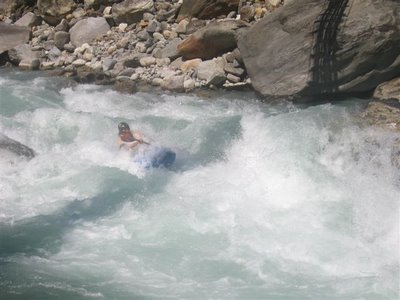
The next day the same guys were off to paddle the Upper Modi Khola. I was tempted to join them but I thought it was too difficult. I decided to join a trip Anton was leading on the Marsyandi instead.
That night at dinner I tried to make sure the trip would happen. I was keen. Anton was keen. All we needed was one more person. All the other Swedish paddlers were also keen, but maybe later, or they needed to talk to someone else who wasn’t there. Arghhh!! Later was not going to work for ME because later I would be in Sweden! In the end as everyone was leaving the restaurant I said, "Well if the trip isn't going then I'm going to paddle the Modi Khola instead". Everyone looked worried.
I still wasn't sure about going on the Modi Khola trip. The guidebook describes the river as “very steep (30m/km) and technical”, and quotes someone as saying “[it is] the most continuous river any of us had ever paddled”. So I asked Anton, who had already run the river, for advice. I didn’t like his answer.
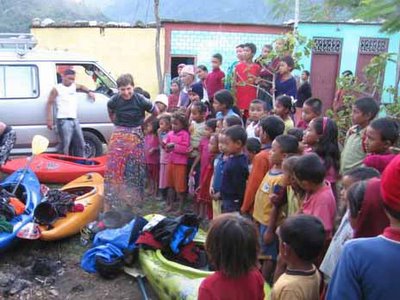
However, I really, really wanted to paddle the river, and the guys encouraged me to come with them. Even Charlie, the lovely French-Nepali Man who runs the kayak shop, thought I should give it a try. I guess what in the end made up my mind was that somewhere deep inside me I believed I was ready for this river, despite what my friends thought. The Extreme Slalom had given me a lot of confidence, and that day on the Upper Seti I had even stayed upright on the one rapid that always turned me over. I felt I was as ready as I ever would be and I wouldn't get another chance.
So the next morning I started up the path to Annapurna Base Camp, carrying to my two dry bags and a paddle. Following me was my porter who had the hard job of carrying my kayak. We provided good entertainment for the trekkers who were walking along this popular track in their normal hiking stuff. The trek reminded me of Mick Hopkinson commenting how a swim kayaking could quickly turn a well equipped kayaker into a poorly equipped tramper. I felt like a poorly equipped tramper!
It was hot and the trek was a lot harder than I had imagined it would be. One of the other guys was obviously sick as he slept through the entire lunch stop, so I grabbed his bag and added it to my load. After all I would need his help the next day so the least I could do was lighten his load now.

When we finally made it to our home stay I went straight to the river. I had seen some of the rapids during the walk in and I was terrified. Down at river level things didn't look much better. The rapids were smaller than I had imagined, but they were hard. Tricky drops were followed by undercut boulders, and one rapid led straight into the next. As I bush bashed my way down the river bank I realised that portaging wasn't going to be as easy and the river was basically in a canyon and a long way below the walking track.
I emerged from my scouting covered in bid bids and made a decision. I would get on the river and I had five rapids to test the water. After that the river entered the canyon and it would be too late to change my mind... With that decided I only had one thing left to do, and that was to prepare my mind.
Those involved in adventure sports know all about peak experience. That is when you attempt something that is at the limit of your skill and experience. Such an experience is hugely satisfying but it can also be extremely tiring. Often at such a time you let yourself get so stressed about the upcoming challenge that your muscles burn out extremely fast. My challenge was not just that this river had some of the hardest drops that I had ever paddled, but that it had over 60 such drops. If I was going to succeed, I had no choice but to stay relaxed.
That morning I woke early after a long sleep, and lay awake listening to the song “Come dance around the world” on my mp3 player. This would be like of a theme song for me, and I played it in my head whenever I was scared as I danced down the river.
In the morning it was still cold as we lowered our boats down to the river and paddled the first few drops. I was nervous of course, but I was doing ok. On a river like this no one can really “look after you”. Your more experienced mates help you out by going first, and giving you a signal but ultimately it's up to you to make the lines and catch the eddies. That day I learnt by watching the other paddlers and copying how they moved. However for the longer rapids, you’re can’t see so much so you have to be able to read the water yourself.

Of course I had a few problems early on. I miss-read one drop and ended up rolling once, and then there was another drop straight away so I rolled again. Another time I missed a ferry glide and ended up in a very nasty section with lots of huge boulders. Luckily instinct told me to lean onto the rocks so I made it through them. I REALLY didn't want to roll there. I decided not to miss any more ferry glides.
As the morning went on the rapids kept coming one after another. All of a sudden I realised I was a lot more relaxed on the water. I had become confident that I could catch the eddies, make the ferries and boof the drops. I was there. I was doing it. I was living my dream.
By the time we got off the river that day I was exhausted. I had started to make mistakes on the easier rapids. The others were the same, even young Nick the probe master was really happy to see Birethanti. He had led most of the river and had a couple of heart stopping moments during the day. One time he ended up getting stuck side surfing a hole, hoping that the guy following him was not going to land on top of him.
That night a I got the ‘peak experience high’. I had come off the river exhausted but after dinner I suddenly found I couldn't sleep. After everyone else had gone to bed I couldn't sleep so I lay awake listening to my mp3 player until the batteries went flat.
The next day I woke up feeling tired and flat. I hadn’t slept much and my stomach was upset so I was low on energy. We still had half the river to paddle so there was no time to feel sorry for myself.
On the river I had to concentrate hard, which I found very difficult. There were several big rapids left. Once on a nasty shallow rapid, a detour because the main channel was blocked by huge fishing net, I lost my concentration and ended up scrapping along the bottom upside down. It wasn’t a very nice experience. Another time Nick held the stop sign up and we all stopped not far above a big drop we couldn’t see. One by one the others disappeared down until I was left at the top. I had no choice to follow over the drop, which turned out to be big and exciting but friendly.
After some time we came to a dam, where most of the water was diverted. We carried round the dam and put in again below it but there wasn’t much water. It felt like I was a ball in the pin ball machine, and it wasn’t fun. This section was full of huge boulders and we could only dream what fun it would have been before they built the dam. Sadly, this is the case for many rivers in Nepal and more seem to be added to the list all the time.
The last section we ran was the Lower Modi Khola which is a little easier. I had paddled it a couple of weeks before and this time I couldn't believe how easy it seemed. It went by so quickly! I was looking out for one of the rapids I had rolled in last time, but I had improved so much that this time I didn’t even notice it until I was on the bus back to Pokhara.

At the end of the Lower section it was time to say goodbye to the other guys. The rest of the team were paddling down the Kali Gandiki, but I couldn’t face the six hour bus ride waiting at the end, so I had decided to return to Pokhara.
I carried all my gear up to the bridge and then across the bridge to the road. Just as I reached the road a bus going to Pokhara stopped. I threw my kayak on the roof, and climbed up there to sit beside it as I was still in my kayaking gear
Travelling on the top of the bus that day was magical. From the top of the bus you have such a great view, of the people, the river, the hills and the mountains. Nepal is so steep it is amazing they have built roads at all. It is something that is easy to miss from inside the bus, but from the top the amazing view unfolds beneath you.

On top of that bus I also felt all my experiences in Nepal come together. I felt I had grown up on the Modi Khola. I now felt I had achieved my dream, and that I could go home satisfied. Even after the bus driver charged me an outrageous tourist price I still felt elated.
Back in Pokhara I still had 3 days left and I still wanted to paddle the Marsyandi. Unfortunately I my friends still weren’t keen. My body wasn’t in very good shape and wasn't getting much energy from my food. I was really sick. I rested for one day and then went to Charlie’s to meet somebody interested in paddling the Marsyandi. If they hadn’t been building a huge dam on the Marsyandi spoiling the paddling for future generations, I wouldn’t have considered paddling in that state. If it hadn’t been my friends Danny and Karla who I met in the shop, I wouldn’t have gone either. But it was, so I went.
The next morning I met international team outside Charlie's shop. This time I had the company of Uri from Spain, Kejii from Japan (our new probes), Danny a Pom, and Karla who hails from Switzerland.
As we climbed aboard the bus to the river I felt really tired and hungry. I wondered where I was going to find the energy to paddle this river. Luckily the antibiotics started to work just when I needed them, and I managed to properly digest the bowl of noodle soup I had for lunch. It was hardly the ideal preparation for this, a grade four, high volume river, but it would be enough.

The Marsyandi is described as one of the best rivers in the world. It is a kayaker's dream with lots of high excitement rapids and many playwaves. It is also a beautiful river where you get magical views of the mountains, and we also saw monkeys playing along the edge of the river.
The Marsyandi, for me, was the river where I realised just how much I had learnt. The rapids were big and we ran most of them without any bank scouting. I felt out of energy, and was a little lazy with my paddling but still I felt confident. Now I knew enough to pick my own lines and to spot the nasty holes before I ended up in them. I could tell which rapids would be okay and which needed more careful scouting. I was no longer just relying on others to make decisions for me, I could make them for myself.
That night as I carried my boat out of the canyon just before the dam, I realised that I hadn’t rolled that day. We had paddled some big rapids and so this fact said it all. My paddling had really improved a great deal since I had first come to Nepal.
 The final day started with a little bit of DIY. Nepalese roads can be tough on boats and the previous day I realised that the trip had caused the mended plastic on the bottom of my boat to split again. We applied a little melted plastic bag to the boat and applied some duct tape over the top. That was enough to reduce the rate of water water coming in to a more manageable level.
The final day started with a little bit of DIY. Nepalese roads can be tough on boats and the previous day I realised that the trip had caused the mended plastic on the bottom of my boat to split again. We applied a little melted plastic bag to the boat and applied some duct tape over the top. That was enough to reduce the rate of water water coming in to a more manageable level.
This second day of paddling was generally a little easier, but there were still a few hard heart stopping rapids. On one rapid it looked like it was just big friendly waves but turned out to be a bit of a hole. A couple of us found this out as we ended up surfing the hole up the right way but underwater!
All in all it was a nice long run with the sun shining and some fun waves. The water was plenty hard enough for me as I still wasn't feeling well. By then I think I could have enjoyed a nice relaxing float trip. In the previous 7 days I had spent one day trekking, five days paddling and the other day sick in bed! I was still glad that I gone on the trip as the Marsyandi is a great river and many of the rapids we paddled will soon be drowned.

On the long bus back to Kathmandu I looked backed on the last week and I felt really proud. I had overcome my own doubts and achieved my paddling dreams. I had seen some awesome places. I had done some wicked paddling. What more is there to life?
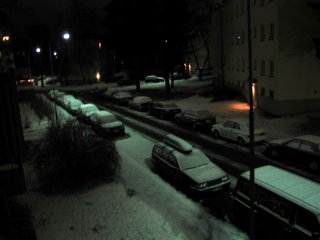 Hi everyone,
Hi everyone,

 However, I really, really wanted to paddle the river, and the guys encouraged me to come with them. Even Charlie, the lovely French-Nepali Man who runs the kayak shop, thought I should give it a try. I guess what in the end made up my mind was that somewhere deep inside me I believed I was ready for this river, despite what my friends thought. The Extreme Slalom had given me a lot of confidence, and that day on the Upper Seti I had even stayed upright on the one rapid that always turned me over. I felt I was as ready as I ever would be and I wouldn't get another chance.
However, I really, really wanted to paddle the river, and the guys encouraged me to come with them. Even Charlie, the lovely French-Nepali Man who runs the kayak shop, thought I should give it a try. I guess what in the end made up my mind was that somewhere deep inside me I believed I was ready for this river, despite what my friends thought. The Extreme Slalom had given me a lot of confidence, and that day on the Upper Seti I had even stayed upright on the one rapid that always turned me over. I felt I was as ready as I ever would be and I wouldn't get another chance.

 At the end of the Lower section it was time to say goodbye to the other guys. The rest of the team were paddling down the Kali Gandiki, but I couldn’t face the six hour bus ride waiting at the end, so I had decided to return to Pokhara.
At the end of the Lower section it was time to say goodbye to the other guys. The rest of the team were paddling down the Kali Gandiki, but I couldn’t face the six hour bus ride waiting at the end, so I had decided to return to Pokhara.

 The final day started with a little bit of DIY. Nepalese roads can be tough on boats and the previous day I realised that the trip had caused the mended plastic on the bottom of my boat to split again. We applied a little melted plastic bag to the boat and applied some duct tape over the top. That was enough to reduce the rate of water water coming in to a more manageable level.
The final day started with a little bit of DIY. Nepalese roads can be tough on boats and the previous day I realised that the trip had caused the mended plastic on the bottom of my boat to split again. We applied a little melted plastic bag to the boat and applied some duct tape over the top. That was enough to reduce the rate of water water coming in to a more manageable level. 
 As usual, luck was on my side, as Sukute Beach Camp is next to the Bhote Kosi river. This is one of the most easy to access rivers in Nepal with great paddling from class 2-4. Also with me at Sukute was my paddling buddy, Anton, who also worked as a kayak instructor at Kajaktiv where I had taught during the summer. Now Anton is only twenty but you would not guess it. He is an awesome play boater, as it turned out, a kind teacher. He first took us down the easy section of the river, and taught me to boof. Later he led us down through the trickier upper section, and while I still quite scared I managed to follow him okay. Another day I paddled with some Irish paddlers. Many laughs later and I was beginning to find my form. I had found what I had lost, my river smile!
As usual, luck was on my side, as Sukute Beach Camp is next to the Bhote Kosi river. This is one of the most easy to access rivers in Nepal with great paddling from class 2-4. Also with me at Sukute was my paddling buddy, Anton, who also worked as a kayak instructor at Kajaktiv where I had taught during the summer. Now Anton is only twenty but you would not guess it. He is an awesome play boater, as it turned out, a kind teacher. He first took us down the easy section of the river, and taught me to boof. Later he led us down through the trickier upper section, and while I still quite scared I managed to follow him okay. Another day I paddled with some Irish paddlers. Many laughs later and I was beginning to find my form. I had found what I had lost, my river smile!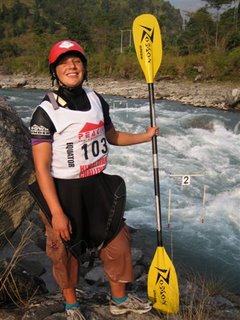

 I thought I could compete well in this event with my background in multisport kayaking, but as it turned out, the race was more about reading the river that I realised. Any time I made up on the few short flat sections I lost on the moving water. At the end of the day, working with the kids during the week, and the first 2 days of competition had taken all my mental energy. On the last day, I just didn't want to win enough.
I thought I could compete well in this event with my background in multisport kayaking, but as it turned out, the race was more about reading the river that I realised. Any time I made up on the few short flat sections I lost on the moving water. At the end of the day, working with the kids during the week, and the first 2 days of competition had taken all my mental energy. On the last day, I just didn't want to win enough.  A lot can happen in one month in Nepal. Plans can go astray, and life can end up more exciting than you had expected. The initial plans for my last month in Nepal were to start with two weeks of hard kayaking, compete in an international kayaking competition and then spend the last week working on a project teaching kayaking to Nepalese children.
A lot can happen in one month in Nepal. Plans can go astray, and life can end up more exciting than you had expected. The initial plans for my last month in Nepal were to start with two weeks of hard kayaking, compete in an international kayaking competition and then spend the last week working on a project teaching kayaking to Nepalese children. As it turned out, we had too many of us there to teach kayaking and not enough equipment. I had come to teach kayaking so this proved a little frustrating until I solved the problem on day two. That day I woke early and headed down to the beach to find the children already running about. From that day on I became
As it turned out, we had too many of us there to teach kayaking and not enough equipment. I had come to teach kayaking so this proved a little frustrating until I solved the problem on day two. That day I woke early and headed down to the beach to find the children already running about. From that day on I became 

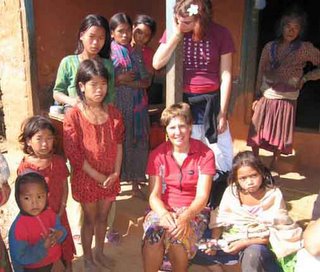
 Every morning we would still play the body parts game, when the kids started getting restless. This got more and more complicated as the days went on. The kids really enjoyed the addition of 'bottom', and 'aeroplane'. 'Aeroplane' was a joke which I couldn't resist when I saw one of the kids doing 'arm', with both arms out like an aeroplane. The amazing thing was that they also got the joke! We also played the action game, so they know eat, throw, kick etc. The body parts were really useful, as I used them when I was looking for a word to go with each sound. No A for apple here!
Every morning we would still play the body parts game, when the kids started getting restless. This got more and more complicated as the days went on. The kids really enjoyed the addition of 'bottom', and 'aeroplane'. 'Aeroplane' was a joke which I couldn't resist when I saw one of the kids doing 'arm', with both arms out like an aeroplane. The amazing thing was that they also got the joke! We also played the action game, so they know eat, throw, kick etc. The body parts were really useful, as I used them when I was looking for a word to go with each sound. No A for apple here!




